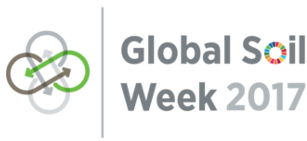In 2015, the Global Soil Week highlighted how sustainable soil management and responsible land governance is key to the post-2015 development agenda and the ongoing negotiations of the Sustainable Development Goals (SDGs). The first day of the Global Soil Week 2015 was dedicated to the link between soils and land and the goals and targets of the new sustainable development agenda. On the second day we started addressing questions of implementation, monitoring and accountability of the post-2015 development agenda and the SDGs. While the SDGs have been developed largely in isolation from each other, the third day explored an integrated approach to the SDGs.
Cross-cutting themes
Since the first Global Soil Week 2012, its partners have been putting certain themes on the agenda. These themes appeared as cross-cutting themes that were addressed on different days of the Global Soil Week in different session formats. Partners of the Global Soil Week continue to work on these themes between the Global Soil Weeks to contribute to political processes towards sustainability in soil management and land governance. They constitute the process element of the Global Soil Week.
Theme I: Land Degradation Neutral World
During the Rio+20 conference, UN member states committed themselves to “strive to achieve a land degradation neutral world”. The results of the Open Working Group negotiations on the Sustainable Development Goals (SDGs) reflect this commitment. Since 2012 and together with partners, the IASS has continued to work on operationalising the concept. For those involved in this process, it is particularly important to acknowledge the interrelations of achieving a land degradation neutral world and responsible and equitable land governance systems. Another important outcome of this process is our emphasis on soil rehabilitation that is covered by other sessions of the third Global Soil Week.
The Global Soil Week 2015 emphasised three aspects of the topic.
Firstly, the Global Soil Week emphasised the importance of combating land degradation to achieve other globally agreed policy objectives, such as mitigating and adapting to climate change. We also addressed the likely land use change implications inherent in the SDGs. Looking at the SDGs from a land use perspective, we asked: How sustainable are the Sustainable Development Goals?
Relevant Sessions: Dialogue Session 1.2 + Dialogue Session 1.6
Secondly, we explored questions surrounding the implementation of the SDGs on national level. In particular, we emphasised questions of monitoring, review and accountability.
Relevant Sessions: Dialogue Session 2.1 + Dialogue Session 3.7 + Open Space Session 4.7
Last but not least, we were exploring the question of indicators and soil information.
Relevant Sessions: Dialogue Session 2.3 + Dialogue Session 3.3
Theme II: Land Governance
The competition for increasingly scarce soil resources warrants responsible land governance to protect the needs of the world´s most vulnerable citizens. The Voluntary Guidelines for the Responsible Governance of Tenure of Land, Fisheries and Forests (VGGT) are a historical milestone to strengthen responsible governance of land and natural resources at national and international level. Negotiated in an inclusive multi-stakeholder process, the VGGT were endorsed in 2012 by the Committee on World Food Security. Since then, contributing to the uptake of the VGGT, within the broader context of translating rights into practice, has been a central objective of the Global Soil Week. At the Global Soil Week 2015, the following activities were central for the work process on land governance and especially for the implementation of the VGGT:
A Dialogue Session served as a platform for sharing lessons learned and discussing strategies and ways forward for the implementation and monitoring of the VGGT by states, international governmental organisations, private actors, and civil society organisations.
Relevant Session: Dialogue Session 3.1
A second contribution was a case study from Madagascar that maps the extent of large-scale land investments. Furthermore, three working groups met back-to-back to the Global Soil Week in order to discuss and review three technical guides that were at this point developed to increase the uptake of the VGGT: a Technical Guide on Commons (IASS), a Technical Guide for the Private Sector (FAO), and a Guide on Aligning the Lending Practice of German Financial Cooperation with the VGGT (DIMR and IASS).
Theme III: Sustainable Land Management (SLM) and soil rehabilitation
Soil and land degradation poses a serious threat to ecosystem services and to the livelihoods of the most vulnerable groups around the globe: 1.5 billion people depend on degrading land for their livelihoods and 42 percent of the very poor live in degraded areas. Sustainable land management (SLM) is key for both the production of goods for human consumption as well as climate change mitigation and adaptation. Preventing and reversing land degradation though sustainable land management and land rehabilitation has thus been a major concern of the soil and land community for a long time. In 2015, the following sessions and contributions focused on SLM and soil rehabilitation:
Relevant Sessions: Dialogue Session 1.4 + Dialogue Session 1.8 + Dialogue Session 2.4 + Dialogue Session 3.5 + Open Space Session 4.2
Theme IV: Transformation through Transdisciplinarity?
Soils require a systemic view. Complex interactions determine whether this resource is used in a sustainable way or not. It is crucial to analyse and understand these interactions in their full dimension in order to sustain the fundamental role that the world’s soil and land resources play in protecting our climate, to securing the nutrition of nine billion people and stopping the persistent loss of the planet’s biodiversity. The idea of the Global Soil Week as a collective process and an inclusive platform is based on the concept of transdisciplinarity. At the heart of this research and working approach lies the long-term exchange and cooperation of different experts, stakeholders and interest groups from politics, science, civil society, economics and art in developing a holistic understanding of a complex problem. This serves as a basis to identify new approaches to address soil and land related challenges to sustainable development. At the Global Soil Week 2015, the role of the transdisciplinary approach in finding joint pathways towards a more sustainable use of soils and a responsible governance of land was discussed in different Dialogue Sessions and Lunch Break Fora and was part of the discussion at the Plenary Session “The Way Forward” on Wednesday afternoon.
Relevant Sessions: Dialogue Session 1.6 + Dialogue Session 2.2
Theme V: Awareness raising and soil communication
Soil is essential for food security, water availability, mitigation of climate change and other ecosystem services. Yet, policymakers often do not take crucial soil functions into consideration. Likewise, general public awareness of the issues of soil and land are necessary to create a societal mandate and momentum for change. Thus outreach and communication of soil and land issues is a very important aspect of transforming the current unsustainable use of soil and land. The United Nations has pronounced 2015 as the International Year of Soils. The Global Soil Week sees this as a special opportunity to increase soil awareness among diverse stakeholder groups and the general public. How can we communicate the vital role that soils play in sustainable development, and our own well-being? How can we create compelling stories to transport the messages? Varied approaches and perspectives from different stakeholder communities around the globe were discussed and presented at 2015’s Global Soil Week.
Relevant Sessions: Dialogue Session 2.6 + Open Space Session 4.1
For a better reading experience, please open the E-Reader in full screen mode.
Please download the programme here.
Global Soil Week 2015 report by the IISD
The third Global Soil Week convened in Berlin, Germany, from 19-23 April 2015 was on the theme “Soil. The Substance of Transformation.”. It brought together 600 scientists, policy makers and practitioners from 80 countries. The reporting service of the International Institute for Sustainable Development (IISD) documented the event and made available daily reports (for Monday 20th, Tuesday 21th, Wednesday 22th and Thursday 23th April 2015) as well as a comprehensive event report. Please download the report here. For the reports on the IISD website, please click here.
Chairman’s Conclusions
This document presents the conclusions by the chairman of the Global Soil Week, Prof. Dr. Klaus Töpfer, Executive Director, Institute for Advanced Sustainability Studies (IASS), Potsdam. Please read the conclusions here.
Plenaries
Watch all plenaries of the Global Soil Week 2015 here.
Session summary videos




































































































































![Session 3.4 - Building a knowledge and innovation platform [...]](https://i.vimeocdn.com/video/519052853_640.jpg)


